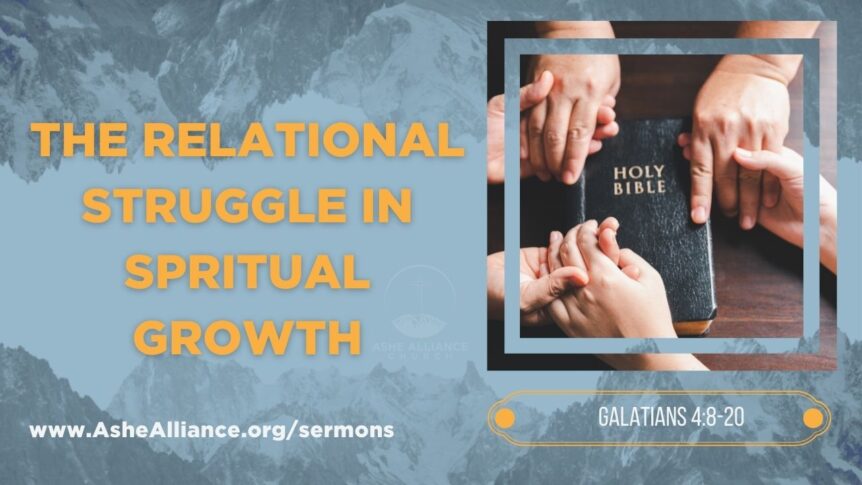Thank you for your patience. We have been experiencing technical difficulties with our video equipment. We hope to be back to posting regular videos to YouTube next Sunday! For now, please enjoy this audio version.
Highlight Reel
Sermon Summary
Relational Struggle in Spiritual Growth
In the passage from Galatians 4:8-20, Paul addresses the Galatians’ return to legalistic practices despite being set free by the gospel. He reflects on their past enslavement to pagan practices and their current regression, urging them to remain faithful to Christ. Paul’s personal plea to the Galatians to become like him, despite his own vulnerabilities, highlights the importance of relational discipleship. He warns against false teachers who seek to undermine his authority and manipulate the Galatians, emphasizing the need for discernment and unity in the church.
Sermon Audio
Shareable Quote graphics



Sermon Text
The Relational Struggle in Spiritual Growth
Main Idea
Discipleship comes at a personal cost but is worth every effort.
If you have ever learned about abusive relationships, you may have learned about how abusers create dependence, making their victims feel incapable of surviving without them. Though the one being abused knows the abuse was wrong… they might have tasted freedom, experienced kindness, and caught a glimpse of a life without fear… Then, they go back to their abuser. Why? Because trauma bonds are powerful. The manipulation, control, and cycles of false hope had rewired their thinking. The fear of the unknown can be worse than the pain they are familiar with. Oftentimes, their self-worth is so eroded that they genuinely believe they have nowhere else to go. And for those on the outside looking in, it can be incredibly perplexing. Why would they go back to a harmful relationship when there is so much more out there for them?
Though it may not involve an abusive relationship, I believe the same patterns are what Paul observed happening with the Galatians. They had been set free by the gospel, yet they were willingly returning to the legalistic system that had once enslaved them. Like a victim of manipulation, they had been convinced by the false teachers that they needed what had once harmed them. And Paul, like a heartbroken friend, pleaded with them to see the truth: You don’t have to go back. Christ has already set you free.
Passage
Galatians 4:8–20 CSB
8 But in the past, since you didn’t know God, you were enslaved to things that by nature are not gods. 9 But now, since you know God, or rather have become known by God, how can you turn back again to the weak and worthless elements? Do you want to be enslaved to them all over again? 10 You are observing special days, months, seasons, and years. 11 I am fearful for you, that perhaps my labor for you has been wasted.
12 I beg you, brothers and sisters: Become as I am, for I also have become as you are. You have not wronged me; 13 you know that previously I preached the gospel to you because of a weakness of the flesh. 14 You did not despise or reject me though my physical condition was a trial for you. On the contrary, you received me as an angel of God, as Christ Jesus himself.
15 Where, then, is your blessing? For I testify to you that, if possible, you would have torn out your eyes and given them to me. 16 So then, have I become your enemy because I told you the truth? 17 They court you eagerly, but not for good. They want to exclude you from me, so that you would pursue them. 18 But it is always good to be pursued in a good manner—and not just when I am with you. 19 My children, I am again suffering labor pains for you until Christ is formed in you. 20 I would like to be with you right now and change my tone of voice, because I don’t know what to do about you.
Remember, there are two core issues at hand:
1. The false teachers are teaching a false gospel that enslaves rather than liberates.
2. The false teachers undermine Paul’s authority to establish their own.
Now that Paul has laid a theological framework and defense, he circles back in a relational tone to tackle these two issues, talking about two things in the past and two things in the present as it pertains to his next argument – the argument from relationship.
I – Past Pursuits (vv. 8-11)
When you didn’t know God, you were enslaved to non-gods. This refers to the pagan practices from which the Galatians had come (though some were Jewish converts). Some abandoned local idols and regional religions, while the majority likely worshiped the Greek gods. We know that in at least one town, Barnabas and Paul were worshiped as Zeus and Hermes. If we examine the Greek gods, we see that they possessed very human characteristics. They were not sinless; in fact, they were terribly flawed, and their tantrums were appeased with sacrifices and offerings. The relationship between gods and humans was largely transactional, focusing more on pleasing the deities than on moral uprightness. Humans were literally enslaved to the whims and fallen faculties of their ‘gods,’ which Paul helped them realize were not gods at all. Paul introduced them to the One True God of Israel and illuminated the falsehood of their previous ‘gods,’ who could never fulfill their true desire for spiritual life. Now, Paul says, you know God- or even better- you are known by God. Not only do you see Him clearly, but He sees you; and the implication is that He sees you favorably through the eyes of grace and mercy, not the unpredictable emotions of the Greek pantheon.
Why are you turning away now? This is a question Paul just can’t understand. After knowing God- the only God that exists- why do you return to those weak and worthless elements of your past that once enslaved you? It’s utterly perplexing why you would trade your freedom for shackles after having been released from your prison cell to breathe free air. All the glories, blessings, and inheritance gained in Christ are exchanged for enslavement, grief, and disappointment. However, there is one caveat. The Galatian believers were not abandoning the God of Israel to return to Zeus or Hermes. Remember, the fight Paul is engaged in is against the false teachers who draw the people into the slavery of Judaic legalism. This is an important distinction. They think they are still following the God who accepted them and freed them from their bonds, but they are backsliding into the same empty forms of legalistic religion they had followed before. Greek philosophers considered some gods to be in control of natural elements like air (Zeus) and fire (Hades). Other religions were animistic, believing that spiritual beings acted as guardians of certain aspects of nature like rivers, lakes, and forests. They may have originated from different systems, but the basic, elementary building blocks of these worldly systems remain, and now they are falling into those same ruts with the Mosaic law. Now, they are observing Jewish rituals and feasts to be in a relationship with Yahweh instead of keeping their eyes on Christ- loving and trusting Him in faith.
Have I wasted my time? This is the question Paul ponders. The Galatians’ rejection of Paul’s gospel and their passionate embrace of the distorted gospel of the Judaizers make Paul question whether there will be any fruit from his efforts in Galatia. How difficult do you think it was for Paul to express that?
Now, reflect on your life or the life of someone you are trying to reach. Were you that person who kept returning to worldly pursuits to fill the voids in your life? Who in your life may have felt this way about you? If you can easily answer that question, take a moment to thank God for their persistence! If this reminds you of someone you are trying to reach, let this passage offer you encouragement. Paul didn’t give up on the Galatian believers, but there were clearly times when even the great Paul of Tarsus questioned whether it was worth it. That should motivate all of us! Even though he had his doubts, Paul continued to write two more chapters of encouragement, clearly believing they were worth every effort he could give, just as your friend or family member is worth it. So were you before you came to Christ in faith. However, it also serves as a warning to recognize your own pitfalls. Where are you prone to backsliding? What things or people are you putting your faith and hope in, other than Jesus?
This concludes Paul’s remarks on their past preferences. Now, he will move forward to the nature of their past personal relationship.
II – Past Passion (vv. 12-15)
I beg you, be like me. He begins this part with a personal and relational plea. Do you want me to beg? Okay, I’ll beg! Please, wake up! This isn’t a sign of weakness, but a deeply rooted love and devotion. And what did Paul want from them? He wanted them to be like him! At first glance, this sounds a bit pompous and arrogant, but take a moment to think through what he really means. Paul said, “become as I am, for I also have become as you are.” This, by the way, is the only imperative command in this section… something worth noting. If it is worth nothing, then let’s take a moment to unpack what it means. What was Paul to the Galatians? Was he not also zealous for the wrong things, believing that the Mosaic law had saving power? If he had known Yahweh through the law, Yahweh would not have needed to show up in the person of Christ and rebuke him face-to-face. Therefore, when Paul says “become like me,” he is encouraging the Galatian believers to keep Christ at the center as they did when they received the gospel. In this way, Paul became like them also… having turned from things that cannot save, to embrace Christ in faith as the only one who can save!
You didn’t despise me. The Galatians embraced Paul as if he were Christ Himself when he came preaching the full gospel of Jesus, despite his challenging physical condition. Some claim Paul had an issue with his eyes because the Galatians were willing to give him theirs, as mentioned in Paul’s conclusion, where he comments on how large his writing is. Some even connect this to the thorn in the flesh from another of his letters, but truthfully, we really don’t know for sure. What we do know is that Paul had a physical ailment that was noticeable and likely a bit repulsive. But none of that mattered. They were blessed by Paul’s care for them and by the message of the gospel, which brought reconciliation and new life. Through the gospel, Paul gave them everything their hearts longed for, and the unity in Christ for the growing church was a tremendous blessing for which they were willing to suffer persecution. But all of that is being destroyed by the false teachers. They are falling back into worthless pursuits and rejecting the very person to whom they were willing to give their sight. Where is the blessing in this regression?
How do you envision this unfolding in our culture today? Picture two preachers walking through the door. One is hunched over and has a noticeable facial disfigurement. The other is tall, broad-shouldered, well-groomed, and dressed in expensive skinny jeans and high-end sneakers. Who do you think most people will gravitate towards? Doesn’t that reveal a lot about the superficial values of our culture? Outward appearance should never overshadow inward transformation. Paul may not have been the most attractive person in the room, but he was the most loving. He was a true shepherd with the authentic version of the gospel… and they embraced him for it. Some of us need to hear that today.
Strength eventually fails. Beauty will always fade. But the inward transformation will endure for eternity.
Now that Paul has reflected on the past… the good and the bad… he transitions to the present.
III – Present Pursuer (vv. 16-18)
What happened? We shared so much. We used to be so close. We were united in our retreat from worthless things and in our pursuit of Jesus. I was once your prized teacher. Why am I now your enemy? Was it something I said? Was it because I told you the truth about this world and yourself?
Poisoned minds. This next part makes me wonder if the Romans didn’t have theatre performances about teenage romance as we have in our movies today. There is a common trope in stories about teenage love that is designed to warn our children about the dangers of picking bad apples. It almost always happens the same way. The teenage daughter meets a handsome and charming boy. He showers her with attention and affection. He is even charming to mom and dad. But slowly, he draws her into a world that is increasingly dark. The parents are the first to notice these incremental changes in their daughter, and they try to warn her, but she won’t listen. She is lovestruck. Then the boyfriend notices the parents catching on to his dark side, so he starts trashing the parents, talking about how they are overprotective, manipulative, and so on. As the story reaches its climax, the boyfriend poisons the mind of his new girlfriend against her parents. Then, that is where things escalate quickly, the girl comes to her senses, she is rescued from a terrible fate, and the evil boyfriend gets his just deserts.
That is essentially what Paul is warning the Galatians against. He knows that everyone wants to be pursued. It’s a wonderful thing when the intentions are pure and noble. Paul sought them out with a genuine heart, and they responded in kind. But now, the false teachers are attempting to court them, harboring unsavory intentions. They want to turn the Galatians against Paul so they can possess them entirely. Paul sees it. The question he asked wasn’t for himself; it was to help them recognize what they were falling into.
Beware of any teacher who is willing to throw others under the bus to gain your affection. There is a time and place to call out wolves to protect the sheep, but the teachers to avoid are those who make a habit of infiltrating flocks, disparaging the shepherd, and stealing sheep for their own possession. Many cult leaders operate this way; unfortunately, many so-called Christian teachers and pastors who fill the pulpit do as well. Real godly leaders will always promote unity. This section is a call for discernment and a reminder to carefully select the voices you allow to speak into your life.
IV – Present Pain (vv. 19-20)
Labor pains. The parental illustration carries over to Paul’s final point for today, but this time, instead of being hurt by a teenage daughter, he likens his struggles to a pregnant mother’s labor pains. Though I’ve never experienced this myself, I hear pregnancy can be quite uncomfortable. The mother goes through morning sickness, hormonal changes, nausea, bloating, fatigue, odd food cravings, and the baby doing leg presses on her bladder. Then, she faces the pain of contractions and everything else that comes with the birthing process. She is managing all of that while her baby is forming in her womb, but the baby isn’t experiencing those same things.
That is how Paul explains his pain. Anyone who comes to Christ is a new creation, but as the old saying goes: “What do you get when an annoying person gets saved? You get an annoying Christian.” Are you made new and washed clean when you are born again? Absolutely! But, that doesn’t mean that you are fully sanctified, know the Bible inside and out, and act perfectly from that moment on. The process of sanctification is a lifetime pursuit. It takes time, just like a baby isn’t fully formed at the time of conception. While the Galatians are learning to become more Christlike, Paul is the one experiencing their growing pains. They don’t feel the pain of their rejection and backsliding, but he does! It would be far better to have this heart-to-heart in person, but he can’t. He isn’t with them, so he must write to them. Maybe he thinks an in-person conversation will allow him to change his tone, but since he can’t be there to see body language and read the room, he has to be harsh.
Next week, Paul will use a familiar story from Genesis to drive home his point, but for now, I want you to recognize a basic truth of discipleship. Relationships are messy. We all come to the table with our own baggage, vices, and misunderstandings, but this is what we are called to. The core command of the Great Commission is not to GO… it is to MAKE DISCIPLES… and, like pregnancy or shepherding your child through their teenage years, it is a long and difficult process. Sometimes, you may wonder if the pain is worth the effort, but it ALWAYS IS. Our ultimate goal for one another is to see Christ fully formed in each other’s lives.
• When I see you backsliding into the chains of your past, I should point it out. Wounds from a friend can be trusted.
• When you see me pulling away from loving fellowship to chase lesser (or sinful) things, you need to call me out on it.
Our spiritual growth operates on a sliding scale, and if we have learned anything from Paul’s exhortations in the meaty middle of Galatians, it is that we are either moving toward the freedom found in Christ or toward the imprisonment of legalistic pursuits. Sometimes we can’t see which road we are on, so we need each other to help us stay on the right path. Will you commit to the discipleship and spiritual growth of another fellow believer?
Questions to Consider
How can you intentionally encourage someone in your life who might be struggling with false teachings or returning to old habits?
How does the message in Galatians 4:8-20 fit into the overall theme of the letter to the Galatians?
How does Paul describe his own vulnerability in dealing with the Galatians?
What does Paul imply about the nature of true discipleship with his exhortation to become like him in verse 12?
FAQs
1. How does the message in Galatians 4:8-20 fit into the overall theme of the letter to the Galatians?
The message in Galatians 4:8-20 fits into the overall theme of the letter by emphasizing the importance of remaining free from legalistic practices and adhering to the true gospel of Christ. Paul is warning the Galatians against returning to their former enslavement to Jewish rituals and feasts, which he sees as a form of spiritual regression. This aligns with the broader theme of the letter, which is to defend the gospel of grace and to encourage the Galatians to stand firm in their faith in Christ (Galatians 1:6-9).
2. How does Paul describe his own vulnerability in dealing with the Galatians?
Paul describes his own vulnerability by expressing his deep concern and love for the Galatians. He mentions that he has become like them, having previously been zealous for the wrong things before his conversion to Christ (Galatians 4:12). He also shares his physical struggles, noting that the Galatians were willing to give him their eyes, indicating their initial acceptance and affection for him despite his physical condition (Galatians 4:15). This vulnerability underscores his genuine care and investment in their spiritual well-being.
3. What does Paul imply about the nature of true discipleship with his exhortation to become like him in verse 12?
Paul’s exhortation to become like him in verse 12 (Galatians 4:12) implies that true discipleship involves a deep personal relationship and a shared commitment to Christ. By saying, “become as I am, for I also have become as you are,” Paul is encouraging the Galatians to maintain their focus on Christ and to avoid returning to legalistic practices. This command suggests that discipleship is not just about following rules but about embracing a personal relationship with Christ and living in harmony with His teachings.
4. How can you intentionally encourage someone in your life who might be struggling with false teachings or returning to old habits?
To intentionally encourage someone struggling with false teachings or returning to old habits, you can follow these steps:
- Listen and Understand: Show genuine interest in their struggles and listen to their concerns.
- Share Personal Experiences: Share your own experiences of struggling with similar issues and how you overcame them.
- Remind Them of Their Freedom: Emphasize the freedom they have in Christ and how returning to legalistic practices can lead to spiritual regression.
- Encourage Biblical Study: Suggest studying the Bible together to understand the true gospel and its implications.
- Offer Support and Guidance: Provide support and guidance, but also be patient and understanding, recognizing that spiritual growth is a process.
5. What does Paul mean by saying that the Galatians are turning back to “weak and worthless elements” (Galatians 4:9)?
Paul means that the Galatians are turning back to Jewish rituals and feasts, which he considers “weak and worthless elements” because they do not provide true spiritual freedom. These practices, while seemingly religious, do not lead to a deep relationship with Christ but rather to a form of legalism that can enslave the believer (Galatians 4:9).
6. How does Paul’s personal relationship with the Galatians influence his message in this passage?
Paul’s personal relationship with the Galatians deeply influences his message. He had previously preached the gospel to them with great passion and care, and they had accepted him warmly despite his physical challenges. This personal connection makes his warnings about returning to legalistic practices all the more poignant and heartfelt. He is not just preaching doctrine; he is addressing friends and former companions who have strayed from the true path (Galatians 4:12-15).
7. What does Paul imply about the nature of false teachers in this passage?
Paul implies that false teachers are manipulative and seek to undermine the authority of true preachers like himself. They court the Galatians with unsavory intentions, trying to turn them against Paul so they can possess them entirely (Galatians 4:16-17). This behavior is characteristic of cult leaders who infiltrate flocks, disparage shepherds, and steal sheep for their own possession.
8. How does Paul’s use of the parental illustration in verses 19-20 relate to his overall message?
Paul uses the parental illustration to convey the pain and effort involved in guiding spiritual growth. Just as a pregnant mother experiences labor pains to bring forth a new life, Paul is experiencing spiritual labor pains as he sees the Galatians backsliding into legalistic practices. This illustration underscores that true discipleship is a long and difficult process, requiring patience, love, and guidance. It also highlights that while the process may be painful, it is always worth the effort to see Christ fully formed in each other’s lives (Galatians 4:19-20).
